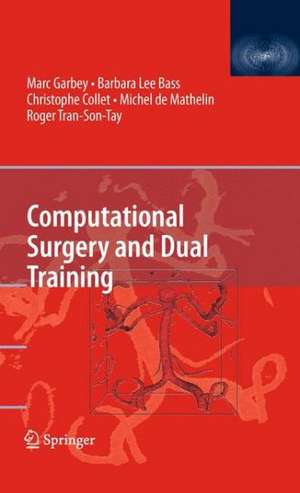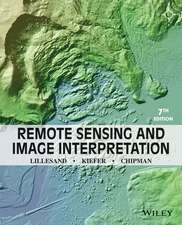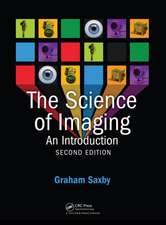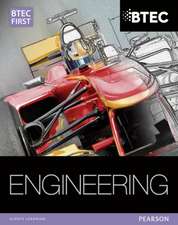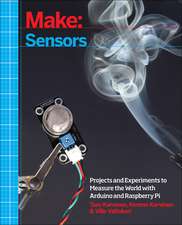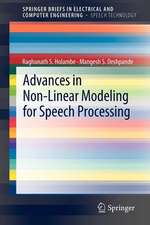Computational Surgery and Dual Training
Editat de Marc Garbey, Barbara Lee Bass, Christophe Collet, Michel de Mathelin, Roger Tran-Son-Tayen Limba Engleză Paperback – dec 2014
| Toate formatele și edițiile | Preț | Express |
|---|---|---|
| Paperback (1) | 1096.25 lei 6-8 săpt. | |
| Springer Us – dec 2014 | 1096.25 lei 6-8 săpt. | |
| Hardback (1) | 993.42 lei 38-45 zile | |
| Springer Us – 22 dec 2009 | 993.42 lei 38-45 zile |
Preț: 1096.25 lei
Preț vechi: 1153.95 lei
-5% Nou
Puncte Express: 1644
Preț estimativ în valută:
209.77€ • 224.31$ • 174.90£
209.77€ • 224.31$ • 174.90£
Carte tipărită la comandă
Livrare economică 18 aprilie-02 mai
Preluare comenzi: 021 569.72.76
Specificații
ISBN-13: 9781489984432
ISBN-10: 1489984437
Pagini: 332
Ilustrații: XVI, 315 p.
Dimensiuni: 155 x 235 x 17 mm
Greutate: 0.47 kg
Ediția:2010
Editura: Springer Us
Colecția Springer
Locul publicării:New York, NY, United States
ISBN-10: 1489984437
Pagini: 332
Ilustrații: XVI, 315 p.
Dimensiuni: 155 x 235 x 17 mm
Greutate: 0.47 kg
Ediția:2010
Editura: Springer Us
Colecția Springer
Locul publicării:New York, NY, United States
Public țintă
ResearchDescriere
The future of surgery is intrinsically linked to the future of computational sciences: the medical act will be computer assisted at every single step, from planning to post-surgery recovery and through the surgical procedure itself. Looking back at the history of surgery, surgery practice has changed drama- cally with the extensive use of revolutionary techniques, such as medical imaging, laparoscopy, endoscopy, sensors and actuators, and robots. This trend is dependent on the use of computer processing, computational method, and virtualization. Computational surgery will not only improve the ef?ciency and quality of surgery, but will also give new access to very complex operations that require extreme precision and minimum intrusion. Such examples are today’s inoperable cancer tumors that have invaded critical tissues or nervous centers. In order for this milestone to be reached quicker and more ef?ciently, surgeons will have to become very familiar with computing methods, such as image analysis, augmented re- ity, and/or robotics. It will be critical for surgeons to assimilate computers in their training, understand how computers work, understand the limitations/advantages of these computer tools, and be able to interpret computer imaging and simulations.
Cuprins
Part I: Surgery Applications and Biomedical Modeling. Abdominal surgery with parascopie procedures.- Pancreas surgery procedure.- Vein graft surgery.- Inflammation and cell dynamic.- Biology of pancreas cancer.- Part II: Methods of Computational Surgery. Hemodynamic and vascular surgery.- Augmented reality and brain surgery.- Quantitative imaging.- System biology.- Augmented reality in abdominal surgery.- Medical robotics.- Optimization in image and signal processing.- Lung dynamics.- Cancer modeling.- Part III: Training in Computational Surgery. Training of surgeons with parascopy.- Training of surgeons with computational tools.- Medical imaging.- Surgery procedures.
Textul de pe ultima copertă
The new and emerging field of computational surgery will improve the efficiency and quality of surgery and will give patients access to very complex surgical operations that require extreme precision and minimum intrusion. In order to effectively deploy computational surgery techniques in life threatening cases such as inoperable cancer tumors that have invaded critical artery tissues or the nervous system, surgeons will have to become very familiar with computing methods, such as image analysis, augmented reality and robotics. Computational Surgery and Dual Training provides the necessary background in computer and surgical techniques that will enable computer scientists/biomedical engineers and surgeons to work together to improve interventional procedures and surgeries. The book brings together contributions from leading minds in the field, who also:
- Provide a foundation in surgical methods for biomedical engineers who wish to do research in the surgical area
- Include material on surgery applications and biomedical modeling
- Offer a detailed discussion of imaging and optimization in computational surgery
Caracteristici
First book on computational surgery and dual training
Provides a foundation in surgical methods for biomedical engineers who wish to do research in the surgical area
Includes material on surgery applications and biomedical modeling
Detailed discussion of imaging and optimization in computational surgery
Includes supplementary material: sn.pub/extras
Provides a foundation in surgical methods for biomedical engineers who wish to do research in the surgical area
Includes material on surgery applications and biomedical modeling
Detailed discussion of imaging and optimization in computational surgery
Includes supplementary material: sn.pub/extras
